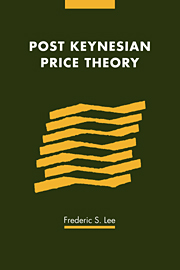Book contents
- Frontmatter
- Contents
- List of figures and tables
- Acknowledgments
- Introduction
- Part I The doctrine of administered prices
- Part II The doctrine of normal cost prices
- Part III The doctrine of mark up prices
- 7 The origin of the doctrine of mark up prices: Michal Kalecki's microanalysis
- 8 Kalecki's microanalysis and the war years
- 9 Kalecki and the Cambridge contributions
- 10 Josef Steindl and the stagnation thesis
- Part IV The grounded pricing foundation of Post Keynesian price theory
- Appendix A Studies on cost accounting and costing practices
- Appendix B Studies on pricing
- Bibliography
- Index
8 - Kalecki's microanalysis and the war years
Published online by Cambridge University Press: 22 September 2009
- Frontmatter
- Contents
- List of figures and tables
- Acknowledgments
- Introduction
- Part I The doctrine of administered prices
- Part II The doctrine of normal cost prices
- Part III The doctrine of mark up prices
- 7 The origin of the doctrine of mark up prices: Michal Kalecki's microanalysis
- 8 Kalecki's microanalysis and the war years
- 9 Kalecki and the Cambridge contributions
- 10 Josef Steindl and the stagnation thesis
- Part IV The grounded pricing foundation of Post Keynesian price theory
- Appendix A Studies on cost accounting and costing practices
- Appendix B Studies on pricing
- Bibliography
- Index
Summary
Oxford
With the outbreak of war in September 1939, economic research at Oxford quickly transformed itself into war-related research. On the one hand, the OERG decided to become inactive for the duration of the war; on the other, the Oxford Institute of Statistics wound down its pre-war activities and embarked upon research which examined the impact of the war upon the various sectors of the economy. Since most of the pre-war Oxford economists had left Oxford for military service or to take up appointments in the war-time administration, it was necessary to replace them, and this meant hiring many refugees from occupied Europe. Thus a group of economists was brought to Oxford in 1940 and stayed together for most of the war. In particular, Kalecki, Steindl, Fritz Burchardt, and G. D. N. Worswick were brought together. Out of their interaction came important contributions to Kalecki's microanalysis (Young and Lee, 1993).
Kalecki had an enormous impact on his colleagues at the Institute. While this was partly due to his published writings, much of it came from long hours of discussion; Burchardt, Worswick, and Steindl utilized aspects of his microanalysis in their own work and also extended and developed what they used. In their analysis of the economics of full employment, Burchardt and Worswick drew extensively upon Kalecki's microanalysis; in fact Burchardt's delineation of the theory of effective demand was done entirely in Kaleckian terms.
- Type
- Chapter
- Information
- Post Keynesian Price Theory , pp. 153 - 164Publisher: Cambridge University PressPrint publication year: 1999



